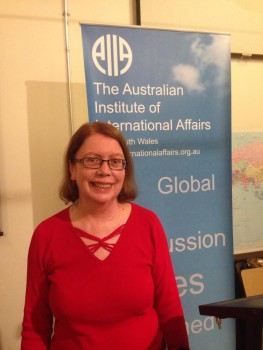How free is the China-Australia Free Trade Agreement?
Dr Patricia Ranald of the University of Sydney is an expert on the social impacts of globalisation and trade agreements. On Tuesday 22 September, she addressed sixty engaged members at Glover Cottages on the China-Australia Free Trade Agreement (ChAFTA). Her central question was: How free is it? How much of a threat does it pose to Australia?
Patricia observed that negotiations on ChAFTA ran in secret from 2005 to November 2014. The text only became known at an official signing ceremony in June 2015 and is currently being examined by parliamentary committees before Parliament considers implementing it after September 2015. Negotiations were made difficult by imbalance in economic bargaining power. Like the Americans, China can and does demand much from Australia and concedes little on market access. There was also a noodle bowl of overlapping regional agreements which have to be rationalised by Canberra, but this will be a long way off.
Patricia outlined two major concerns she has about ChAFTA. The first relates to labour. ChAFTA will exempt temporary skilled workers engaged in projects in Australia from labour market testing as a condition of temporary entry and remove the requirement for mandatory skills assessment in ten designated areas. This leaves open opportunities to exploit the vulnerability of guest workers and degrade the Australian wage-fixing system. The minimum wage envisaged under ChAFTA is $53,900 per worker per annum, much lower than Australian wages. The Australian government has also vastly exaggerated the number of new jobs that will be created in Australia under ChAFTA and its impact on the Australian GDP. The government claims 178,000 additional jobs by 2035. But the Canberra-based Centre for International Economics claims the modelling has been mangled and butchered by the government and the true figure is more like 5,434 extra jobs in the suggested time frame. Meanwhile, Patricia observed that neither the Australian nor Chinese governments had given thought to implementing basic labour rights.
The second concerns Australian laws. Investor-State Dispute Settlement (ISDS) clauses will give ChAFTA-nominated extrajudicial tribunals influence over significant areas of public interest and override Australian courts and laws. Among many other things, ISDS mechanisms could remove country of origin food labelling, prevent Australian governments from implementing local procurement policies, attack environmental laws and legislation designed to address climate change, prevent moratoriums on genetically-modified organisms and coal seam gas extraction, and risk affordable medicines under Australia’s Pharmaceutical Benefits Scheme. Patricia mentioned two cases currently before ISDS tribunals. One involves a United States prospecting company suing the province of Quebec for hundreds of millions of dollars for suspending a shale gas and oil operation. The other was the notorious case of the tobacco giant Phillip Morris suing Australia from Hong Kong for damages it allegedly has suffered as a result of Australia’s plain packaging laws.
Ending on a slightly more optimistic note, Patricia speculated that Parliament was not entirely powerless against the Executive, at least on the degradation of Australia’s labour laws. It could amend the Migration Act to enforce labour market qualifications.
Report prepared by Richard Broinowski
